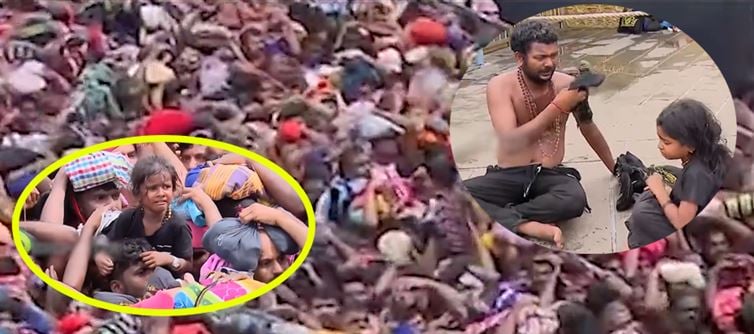
The Mandala season has barely begun, but sabarimala is already buckling under the weight of its own crowds — and under the failures of those responsible for managing them. Over one lakh devotees are pouring in daily, yet the infrastructure looks unprepared, understaffed, and overwhelmed. Pilgrims are reporting 15+ hour queues, water shortages, broken sanitation facilities, and treacherous pathways. What should be a spiritually uplifting journey has instead become a test of endurance, exposing a governance breakdown that has been worsening year after year.
1️⃣ No Water, No Cleanliness, No Planning — A Basic Failure on Every Front
Multiple reports from The Hindu, Deccan Chronicle, and hundreds of posts from the ground zero area reveal the same picture: water scarcity, overflowing waste, and sanitation on the verge of collapse. Even before peak season, devotees are struggling for basic dignity. When tens of thousands walk miles barefoot with no access to safe drinking water, it isn’t mismanagement — it’s negligence.
2️⃣ 15+ Hour Queues Are Not ‘Tradition’ — They’re a red Flag
Sabarimala’s rush is legendary, but queues stretching up to 10–15 hours are not normal, safe, or acceptable. people collapsing from exhaustion, dehydration, or suffocation is not a seasonal inconvenience — it is a warning sign of crowd-control systems buckling under pressure. A pilgrimage should elevate the spirit, not test the body’s breaking point.
3️⃣ Devotees Report Cables, Construction Work, and Hazard Zones
Anecdotal accounts speak of live electric cables, ongoing KSEB work, and equipment lying in the middle of the pilgrim movement. Even if not universally confirmed, the sheer volume of such complaints shows one thing: the ecosystem around sabarimala is disorganised and unsafe. Managing lakhs of people requires precision — not improvisation.
4️⃣ The Ground Reality: The Mandala Season Has Only Started — The System Is Already Overwhelmed
This is not the peak of the season. Yet water points are failing, crowd movement is choking, and basic facilities look strained. If the system is collapsing now, what happens in the next 4 weeks when footfall doubles? The authorities needed a war-room approach. What we see instead is a slow-motion scramble.
5️⃣ Travancore Devaswom Board & State Machinery Must Take Accountability
The TDB and state authorities promised better management this year — but the situation on the ground tells a different story. More staff, more medical support, real-time monitoring, and water stations should have been activated before the rush began. sabarimala is not an unpredictable event. It comes every year, and yet every year the crisis is repeated.
6️⃣ devotion Deserves Dignity — Not Chaos
Devotees walk miles with discipline, fasting, austerity, and faith. They deserve:
clean pathways
drinking water
hygienic restrooms
predictable crowd flow
safe walking routes
medical support
These are not luxuries — they are the foundation of a spiritual journey. When these collapse, the entire pilgrimage experience collapses.
7️⃣ Governance Cannot Treat Temples as Revenue Centres
When temples are treated as mere revenue pools, accountability evaporates. Governance becomes transactional. Facilities degrade. And the brunt is borne by the lakhs of ordinary devotees whose only expectation is a dignified pilgrimage. Faith cannot be monetised and forgotten. Faith needs administration, not exploitation.
8️⃣ The Astrology Angle: A Cultural Reflection, Not a Political Statement
Many devotees and traditionalists have expressed a deeper concern — that when sacred spaces fall into mismanagement and corruption, the spiritual energy of society itself weakens. Whether one sees this through the lens of religion, culture, or astrology, the sentiment is clear: a society that neglects its sacred institutions invites deeper turbulence.
9️⃣ The Remedy Is Simple: Fix the Temples — Fix the Systems
Temples must be:
transparent in administration
protected from mismanagement
equipped for scale
managed with a disaster-prevention mindset
staffed adequately
modernised without losing tradition
When pilgrimage centres function efficiently, safely, and spiritually, society benefits. When they collapse, the fractures are felt everywhere.
🔟 Devotees Need Action, Not Excuses — And They Need It Now
This Mandala season has already seen distress, panic, and breakdowns. If corrective steps aren’t taken immediately, the coming weeks could become dangerously chaotic. The state must treat sabarimala not as a seasonal crowd event, but as a high-risk spiritual cluster that demands precision planning and round-the-clock oversight.
Devotees deserve better.
Sabarimala deserves better.
India deserves better.




 click and follow Indiaherald WhatsApp channel
click and follow Indiaherald WhatsApp channel